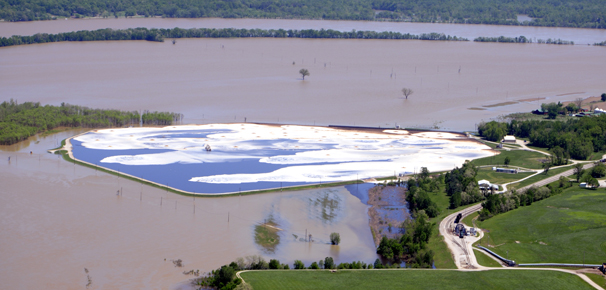May 31, 2011-by the Herald Leader.
On election night, Gov. Steve Beshear talked about how he has stood with Kentucky families as they “dug deep” to endure an economic downturn and a “series of unforeseen and devastating weather catastrophes.”

Floods at the end of April nearly breached the wastewater impoundment operated by Domtar Paper in Hawesville, KY. Photo © 2011 John Blair
It has been one disaster declaration after another in recent years as floods, snow, wind and drought have pummeled Kentucky, disrupting business, destroying property and crops and endangering lives.
Not surprisingly, our coal-worshiping governor did not go on to make the connection being made by scientists: The documented increase in extreme weather is the predictable outcome of climate change brought on by the accumulation of heat-trapping fossil fuel emissions in the atmosphere.
Warmer oceans produce more evaporation; warmer air holds more moisture. The average temperature has risen by more than 2 degrees Fahrenheit over the last 50 years. This increases water vapor in the air; even small increases have a big impact on the size of storms because storms draw moisture from far beyond their locales.
Scientists are observing less rain falling in light precipitation events and more downpours, according to the U.S. Global Change Research Program. From 1958 to 2007, the amount of rainfall in the heaviest 1 percent of storms increased 31 percent on average in the Midwest and 20 percent in the Southeast. Heavier snowfalls are another consequence, as are stronger hurricanes, powered by extra moisture from warming oceans.
Also increasing in intensity and frequency are heat waves and droughts as weather patterns — along with plant and animal species — move northward. Kudzu has made it to Canada. Large storms also create conditions favorable to drought by depleting moisture in the atmosphere.
Scientists have too little data to draw conclusions about tornadoes, but warm, moist air near the surface drives supercell thunderstorms which are tornado precursors.
Climate change won’t be the end of the world, but it will exact a price in economic and human terms and create a host of new challenges. It already is. Just ask those flooded out by the Mississippi River or baking through chronic drought in Texas.
Climate change trends will become more pronounced without reductions in carbon dioxide and other heat-trapping gases. The biggest source of these gases is coal-fired power plants followed closely by transportation.
Yet what we hear from Beshear are rants about a “war on coal” and “get off our back” demands to federal environmental regulators.
In this regard, Beshear has plenty of company. Only a scant few Kentucky politicians — Reps. John Yarmuth and Ben Chandler come to mind — are brave enough to even acknowledge that our heavy dependence on coal comes with downsides.
Last week, Beshear was ranting about KU’s and LG&E’s plans to comply with clean air standards by investing $2.5 billion in new air pollution controls, a massive construction project that would employ 3,000 to 4,000 people.
Cleaner power plants will cost the average household an extra few hundred dollars a year in electric bills. The benefits from reducing the little bits of arsenic- and mercury-coated coal waste floating in the air and lodging in our lungs would be a reduction in asthma, heart and lung disease and cancer.
Another coal worshiper, Sen. Mitch McConnell, put out a release last week saying he had stressed to the head of the National Institutes of Health the importance of federal funding for cancer research in Kentucky because the state leads the nation in cancer mortality. (Cancer. Coal. Coincidence?)
No one is saying we should shut down all coal-fired power. We couldn’t.
But the quicker the coal industry and Kentucky’s economy adapt to new realities, the better their chances of remaining viable.
Beshear was right when he equated the economic and weather disasters. Unfortunately, Kentucky will be stuck in a disastrous holding pattern until it demands leaders who don’t blind themselves to the costs of coal.
